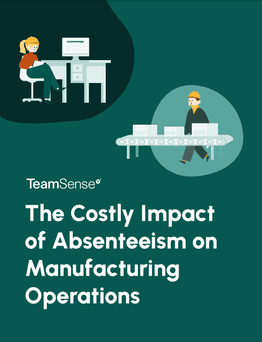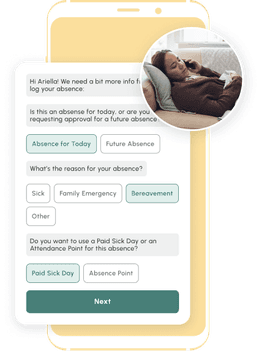When to HR with AI (and When Not To)!
Chances are, if you’ve scheduled 100 workers for a shift, 11 of them didn’t make it in at all—and another 6 showed up late to the job.
While we’ve already discussed the high costs of absenteeism (and what you can do about it), it’s high time we addressed the issue of chronic tardiness.
Six percent of hourly workers arrive to work late on average, and while that may not sound like a huge number, it can have a significant impact on productivity: In retail, a one percent increase in tardiness leads to one percent lower sales. And one study found that the total cost of tardiness costs U.S. businesses $61 billion per year.
How should you deal with employees who are regularly late? If you jump straight to firing them, you may end up losing out on otherwise strong workers, and will be spending a lot more in recruiting costs to replace them.
Instead, it’s important to take a proactive approach to managing workers who don’t show up on time, so that you can re-engage them and encourage them to become model employees.
Why Are Employees Late?
First, let’s get to the root of the problem: Why are employees coming in late?
Some of the most common causes for showing up late include:
Getting stuck in traffic (25%)
Personal issues (18%)
Oversleeping (15%)
Child-related issues (12%)
Health issues (12%)
Family-related issues (12%)
As this list illustrates, tardiness may come down to poor time management (or forgetting to set an alarm) in some cases, while in others, it’s out of the employee’s hands, especially if they’re juggling with caregiving responsibilities.
As a general rule, try to default to empathy when employees are late occasionally. Giving them grace will show that you’re an understanding and caring manager, which will boost your employees’ morale. That said, if certain employees are late on a frequent basis, it’s important to put a strategy in place for handling the situation effectively.

The Costly Impact of Absenteeism on Manufacturing Operations
Learn how chronic, unplanned absenteeism is a costly impediment to manufacturing productivity and efficiency, and how you can reduce absenteeism.
Strategies for Handling Chronic Lateness
So you cut an employee slack the first time they were 20 minutes late—but what about the third, fourth, or fifth time?
By putting a dedicated strategy in place for managing employee tardiness, you can address such situations proactively. You’ll be able to provide guidance to your team members around demonstrating expected behavior at work, with repercussions for when those expectations aren’t met. By building a clear culture of accountability, you’ll be able to boost morale, reduce tardiness and absenteeism, and keep productivity rates high.
Start with Clarity & Communication
Good communication is key to building a strong relationship with your employees. When dealing with chronic tardiness, it’s important to make sure expectations and policies are clear.
Build Clear Attendance Policies
If you don’t already have an attendance policy that addresses both tardiness and absences, it’s important to build one and review it with all of your existing employees. As you onboard new employees, make sure that attendance policies are clearly communicated. Your policy should clearly state the consequences for repeated tardiness. Ensure that your policy documents are available in multiple languages, reducing the risk of language barriers making it difficult for employees to understand the rules at work.
Review Expectations
Make sure that your employees clearly understand their scheduled hours, break times, and the impact of tardiness on team performance. In some cases, there may be a misunderstanding: For instance, maybe they think they’re supposed to get to the employee parking lot at the start time, when they’re still a 10-minute shuttle ride away from the actual job site, resulting in tardiness. By being clear about the specific times you expect employees to show up at each location, you can minimize the risk of communication gaps.
Have a One-on-One Conversation
If an employee is regularly showing up to work late, talk to them and find out what’s going on. The issue may be due to a family or transportation problem that they’re trying their best to resolve, so being patient and understanding can help you work out a solution to the problem together. When relevant, connect them with your HR team, so that they can review employee benefits that may provide support with their situation.
Focus on Accountability
If employees don’t realize you’re paying attention to when they arrive, they’re far more likely to show up late. Here are some ways to hold your team members accountable.
Require Employees to Clock In
Don’t rely on time sheets that employees can easily fudge: Almost half of all hourly workers admit to adding time at the beginning or end of their shifts that they didn’t work. For enhanced accuracy, use a time clock that requires employees to manually clock in when they arrive. If your time tracking solution includes GPS tracking verification, employees can even clock in on their own mobile devices.
Document Everything
If you notice an employee coming in late, make a note of it, even if you let it slide the first time. It’s important to have thorough documentation of every late arrival so that you can use the evidence to build a disciplinary plan.
Use Progressive Discipline
A single offense shouldn’t lead to job termination—but employees need to know that if they continually show up late, that’s likely to be the final outcome. Use a tiered system (verbal warning → written warning → final warning → termination) to provide your employees with opportunities for improvement, with clear repercussions if they continue to show up late.
Optimize Your Operations to Support Employees
Keep in mind that you don’t want to lose good employees because of solvable scheduling issues. If your team members have valid reasons for showing up late, here are a few ways you may be able to help.
Offer Flexible Scheduling (If Possible)
If an employee is continually late because the first bus doesn’t run until 20 minutes before their shift, or they need to get their kids to school prior to leaving for work, it will probably be easier to change their shift time than for them to get to work earlier. Talk to these employees about switching to a different schedule that will be easier for them to accommodate.
Enable Time Banking
Some job sites require all team members to be on hand before production can begin, making tardiness non-negotiable—but in some functions, it may not matter as much whether an employee is 15 minutes late, as long as they make up the work on the other end. When possible, give employees a grace period around arrival, as long as they’re willing to make up the time on the other end.
Incentivize Punctuality
Employees tend to respond better to positive reinforcement than negative, so look for ways to celebrate punctuality in the workplace. Offer small perks (gift cards, extra break time, public recognition) for perfect or improved attendance over a set period. Marriott Hotels, for instance, offers a monthly bonus of $100 for perfect attendance, honoring employees who consistently show up on time with a financial reward.
Behavioral & Motivational Approaches
Tardiness often has a root cause, especially if it’s a growing trend across multiple teams—so it’s important to take the time to evaluate your overall workforce health and understand what’s going on.
Assess Employee Morale
Are your workers engaged in the team culture and happy to contribute? Or are they more likely to be stressed out and overworked? You can use a tool like TeamSense to measure employee satisfaction rates in real-time with Pulse surveys and other quizzes, then analyze your data to understand the difference in engagement levels across teams.
Support Professional Development Goals
If your employees feel like they’re working at a dead-end job, they’re less likely to take it seriously. That means they’ll show up when they feel like it, rather than rushing to arrive at work on time. To change their attitude, show your team members that they have opportunities to grow within your organization. Create a professional development path for each employee, making it clear that metrics such as punctuality and attendance are counted when determining which employees to recommend for promotion.

No one wants to talk to their boss or a 1-800 stranger to call off. Text changes everything - Reducing No Call No Shows.
Improving Communication Around Tardiness and Absences
In some cases, employees can’t avoid showing up late—but they can communicate their absences to you before they cause issues to your operations.
By implementing an attendance management system like TeamSense, you can make it easier for employees to let you know when they’ll be tardy or absent for a scheduled shift. Rather than forcing them to call a phone tree, and potentially be subject to long hold times when they’re already running late, they can simply send a text message to a centralized platform alerting their supervisors and HR team to their absence. You can collect data around their estimated arrival time, as well as their reason for being tardy, which will help you build an informed operational plan that maximizes efficiency.
Using an attendance tracking solution that integrates with a time tracking solution makes it easy for your team to understand trends in tardiness and absences, on an employee or a team level. You’ll be able to set up automated alerts to notify employees when they’re receiving a warning or other corrective action for excessive tardiness or absences, holding them accountable for their actions and encouraging compliance with your workplace policies. You’ll also be able to effortlessly sync your attendance data to your HRIS, ensuring accuracy in payroll and compliance with regulations including FLSA.
Our best-in-class attendance management system can help you reduce absentee rates by up to 40%, and build a culture of accountability that will help your team members thrive.
Ready to learn more? Book a demo today.
About the Author

Jackie Jones, Employee Engagement & Attendance Specialist
Jackie Jones has over three years of experience helping HR teams improve employee morale, reduce absenteeism, and create happier, more engaged workplaces. With a strong background in employee relations and attendance management, she brings practical strategies and insights that support frontline teams and the HR professionals who lead them.


